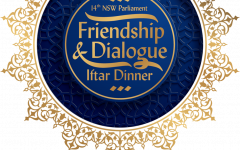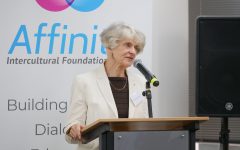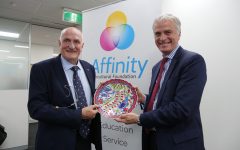Twin talks: A Recap of Professor Scott Alexander’s 2017 Sydney tour
August 18, 2017 2022-05-16 5:48Twin talks: A Recap of Professor Scott Alexander’s 2017 Sydney tour
Twin talks: A Recap of Professor Scott Alexander’s 2017 Sydney tour
Professor Scott Alexander, from the Chicago Catholic Theological Union delivered two talks during the Sydney leg of his Australia and New Zealand tour in August with a presentation titled, Reforming Reform: Hizmet and the survival of ‘Civil Islam’ in contemporary Turkey and another one titled Difference in Dialogue: Promise or Peril?
The first event was held on Monday 7 August at Western Sydney University’s new Peter Shergold Building in collaboration between Affinity Intercultural Foundation and Western Sydney University’s School of Social Sciences and Psychology.
The talk included a response from Professor Kevin Dunn, Dean of the School of Social Science and Psychology and Professor in Human Geography and Urban Studies from Western Sydney University (WSU). The conversation was moderated by Associate Professor Cristina Rocha, WSU’s Director of Religion and Society Research Cluster.
Special guests in attendance included Deniz Erdogan, Executive Principal of Amity College, Laura Beylerian, Multicultural Community Liaison Officer from the Department of Social Services as well as Commander Jodi Radmore from the NSW Police Force.
Professor Alexander began his talk by giving a background of Islamic renewal and reform, before highlighting its contemporary iterations, which include Neo-Modernist, Neo-Traditionalist, Puritan and Shiite thought.
He discussed Secular Nationalism and the seeds of “civil Islam” (a term coined by Professor Ihsan Yilmaz) in the Nurcu and Hizmet Movements and proceeded to highlight the principal teachings of Fethullah Gulen, which are inspired by Said Nursi and the Nurcu Movement.
For Professor Alexander, the survival and future of “civil Islam” in Turkey and other Muslim majority societies will depend on a “re-evaluation of the role of the state in post-colonial social renewal and reform, as well as the depth of popular commitment to an intersectional approach to building strong civil societies.”
Professor Alexander’s second presentation was on Tuesday 8 August with a Lunchtime Lecture at Affinity Intercultural Foundation’s offices in Sydney on the topic of Difference in Dialogue: Promise or Peril?
The talk included a response from Professor Neil Ormerod, Professor of Theology at the Australian Catholic University. The conversation was moderated by retired ABC radio journalist, John Cleary.
Special guests in attendance included Leo Oaeke, Papua New Guinea Consul, Karl Hartleb, Austrian Consul-General and Anthony Long, Chief Inspector Commander of the Engagement and Intervention Unit, Anti-Terrorism and Security Group and Counter Terrorism and Special Tactics Command from the NSW Police Force.
Professor Alexander prefaced his talk with a positive affirmation. “Coming together for the fellowship of ideas is a sacred act…intercultural dialogue is like stepping into someone’s garden. You don’t know where the seeds are planted” he said.
In his talk, Professor Alexander interrogated what he refers to as the ‘sameness platitude’ and questioned what inter-religious forms of dialogue would be like if they were founded on the alternative premise that we are often more different than we are alike.
He quoted verse 13 from the Surat al-Hujurat from the Quran to highlight that “human difference is not an accident of history, but instead an outcome of divine providence and design.”
According to Professor Alexander, our difference should be viewed as, “an opportunity for growth…in knowledge and awareness of one another, self, and ultimately God through the process of relational encounter in difference.”
He questioned why in the present day, society is still afraid of difference. He offered that one reason is because we have “become so attached to the necessary but limited sense of security we get from homogeneity and the familiar, that we erect it as a false idol and lose the capacity to see the inherent beauty and transformative power of the heterogeneous and the strange.”
He proposed that dialogue and education be viewed as “sources of hope” to counteract hostile views of difference. Professor Alexander concluded his talk with a hopeful message about looking inwards and self-reflecting to realise our potential and begin to take positive action in our daily lives.
“Oftentimes we find ourselves spending a great deal of time waiting for governments and the powerful to act in the face of injustice…if we can turn our foci from waiting to doing, from the expectation that it is for others who are more powerful to act, we will never open ourselves to the miraculous ways in which God can act in and through us.” he said.
Overall, it was a wonderful event as many in the audience remarked on the well-delivered and thought-provoking presentation and discussion.
You can view the recordings and photos from the event below.





